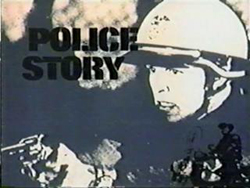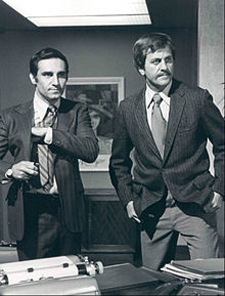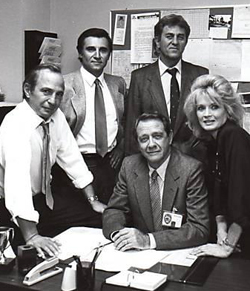
I had been, as they say, raptured.
Why? Because I had just finished all six discs of the first season of what was THE most groundbreaking cop show of the 1970’s (’73 – ’77). Maybe the most freakin’ groundbreaking cop show ever.
Police Story.
Created as an anthology series for TV by the greatest cop writer ever, Joseph Wambaugh, this show was tough and gritty, with realism not ever seen before. I mean, before this we had Adam 12 with their plastic but fun cops, Martin Milner and Kent McCord. They were awesome and all that, but really… it’s like using your GI Joe and a Ken doll to ride the streets of late 60’s Los Angeles to fight crime.
Plas-tic.
Then there was the immortal Dragnet with Jack Webb, and also Highway Patrol with Broderick Crawford. But let me ask you this: what did all these shows have in common?
TV Cops that were cardboard.
Until Police Story.
Then suddenly, cops had lives outside their jobs. They hurt. They had failed marriages, and marriages they were failing in. They had problems. They had a society that hated them, one that no longer held them in the “Adam 12” light. Now, cops were to be feared, and misunderstood.
It was a game changer, this show. Wambaugh had already written two of THE greatest cop novels of all time, STILL two of the greatest by all accounts: The Blue Knight (turned into an okay sort of TV show, starring George McGovern), and of course, The New Centurions, probably THE first shot across the bows in redefining the policeman/cop/pig mythos.

The very first episode on the disc, Slow Boy, had a cop with a broken marriage. What? TV Cops wives stood by their husband’s side, didn’t they? So much so that they didn’t even need to be mentioned! Not here, folks. (An aside: I believe you can trace shows like Hill Street Blues, with all their character’s dysfunctional relationship issues directly to Police Story.) In Slow Boy, the cop, played by the awesome Vic Morrow, meets up with one of the civilians he saved in an armed robbery at a supermarket, expertly played by Diane Baker (Sen. Ruth Martin from Silence of the Lambs). Morrow gets the job done, but in a way that’s violent and risks her life. She thinks he’s a “pig”, one of “those” cops who love violence, etc. How their relationship unfolds was groundbreaking back in 1973, definitely a direct reflection of the times in which it was created. We were trying to humanize EVERYTHING back then: soldiers, enemies, cops, robbers. Everything, except maybe politicians. That episode was a great way to introduce a new series that wanted to be different.

And all of this is not only to the credit of Joseph Wambaugh, but also writers such as E. Jack Neuman, Mark Rogers, Michael Mann (yes, THAT Michael Mann), Don Ingalls, and a wealth of other talent. All of these guys wrote a TON of TV and movies. And it was sort of talent pool, both behind and in front of the camera that set Police Story apart from all the others. It’s still hailed today as high point in the development of TV cop shows. I couldn’t recommend it more. Last, but not least, there was the awesome, killer closing theme complete with Wah Wah pedal.
Enjoy!
Robert Lewis grew up under the pier at Venice Beach, CA. There, by firelight, he would entertain the stray dogs with weird and wonderful tales. He’s still telling stories, but now he lives in a place with walls, a roof, and cases of red wine. Crime fiction and blues guitar are his things. He blogs over at NeedleCity, and twits sporadically and nonsensically as @robertklewis.

Really dumb article by a guy who doesn’t know what he’s talking about. It’s a cliche to say Dragnet and Adam-12 had officers who were “cardboard” and “plastic.” Of course Webb’s style was different than Wambaugh’s, but if you actually watch the episodes, Webb addresses cops and their personal and job-related problems, too. Numerous other mistakes in the article (including the howler that Police Story invented the anthology format…with different actors! Wow!!). Amateur night in Dixie here.